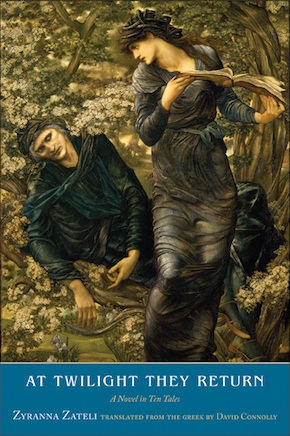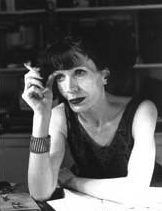Vagrant tales
by Mika Provata-Carlone
“The stories are compelling, but what pulls you through is the style, the voice, the simple yet gorgeous fabric of her language.” Karen Emmerich, Princeton University
Before Greece embraced modernity and its marvels, it was a nation of stark realities and pernickety sprites. Lore and legend held as much validity as did hard facts in the popular imagination, but also in the synthesis of what was no less than a national soul. Sprites, trolls, crones, harridans and ogres, with innumerable names, uncountable individual knacks for mischief and the most spectacular features, inhabited every mountain slope and river bank, tree shrub, courtyard well or miller’s storehouse. Some were even regular seasonal attractions, defining calendars, lives, futures. The Greeks were compulsive storytellers, spinning epic yarns out of a twig that had happened to stir in the wind. Every region had its heroes and villains, its nonagenarian enchanters, who thrilled and terrified eager ears in equal measure. A special language existed for these stories, malleable and mellow, trilling with local gutturals and plosives, with lilts and brash echoes, rhythms and dynamics.
In the transition from vernacular to writerly expression, much was lost but much was also retained. Writers made agonising decisions as to where they belonged: a world of yesterday full of spooked wonder or the world of tomorrow, indomitable in its steely, crisp imagism, symbolism and aestheticism. Among those who chose the former, Alexandros Papadiamantis is perhaps the foremost, with his Dostoyevsky-like sobriety, his brothers Grimm anthology of dark folklore, and his mesmerising, obsessive asceticism – especially his depthless humanity. Kostis Palamas and Angelos Sikelianos infused their writing with what can only be termed a transcendental, poetic ethnography, whereas more local voices, such as Ilias Venezis or Costas Hatzopoulos, Konstantinos Theotokis, Andreas Karkavitsas and Stratis Myrivilis, added this intangible, contradictory but also unifying dimension to Hellenism at large – its very specific borderlessness, its subsistence in a subliminal but also concretely real space. Restless, often tormented spirits, such as Yannis Skarimbas or Nikos Gabriel Pentzikis, will fuel it with scepticism, agony, vision, daring, push it beyond limits to an uncharted land of both language and experience.
Zyranna Zateli is a contemporary Greek writer harking back to that same moment of pre-modern discursive exuberance, to its mythic roots, socio-ethnographic analysis and tactile representations of life as it happened – and especially of life as it affected the mind in infinite ways, far beyond reason and rational comprehension. She does so with a contemporary sensitivity, an acute awareness of the powers – minute as well as gigantic – of words and diction to define an existential potential, an individual or national identity, and even survival. In At Twilight They Return, she undertakes a mighty task: to bridge past and present in such a way that continuity will remain unassailable, while exposing all the gaps and fissures, the tectonic shifts in society, history, mentality, the very state, future and purpose of language and narrative.
Her language has idiosyncrasies and whimsies, is self-indulgent and determined to mesmerise, even engulf the reader in this potent surge of perfectly calibrated babble.”
Zateli weaves together the mind-bendingly infinite strands of a single family over several generations, clan mutations, historical transformations. In her hands, the I of the traditional storyteller, the Homeric rhapsode, picks up the terrific momentum and self-reflectiveness of the roman fleuve and of interior monologue, the elusive omnipotence of multiple perspectives and of unreliable narrators – of post-modern, subsumed and all-devouring wordsmiths interfering with the tale as much as they erect its grand edifice, and the result is like a phoenix reborn: a village saga embellished with pastoral magic yet with a resonant presence and feel.
Her language – and David Connolly’s translation serves it masterfully and powerfully – has idiosyncrasies and whimsies, is self-indulgent and determined to mesmerise, even engulf the reader in this potent surge of perfectly calibrated babble. It is cyclical, ebbing and flowing like human destiny, nostalgic and lost in oblivion, just as it is sharp, biting, with the cutting edge of a starker realism. It is full of its past, its customs and traditions, and radical in the way it transforms them, seizes them and makes them yield to the needs of different narratives, exigencies and worlds of experience. It has the madness of a visionary, or of atavism, and the penetrating lucidity of a conscience beating at full throttle. Above all it is close to the earth and the people it gives life too, with darkness and chthonic undertones as well as the lull and conviction of eternity.
Beliefs and superstitions, customs and primeval gestures knit themselves together inextricably in this story where everything is irrespirably but also cathartically close to the very throb of life – life before and beyond time. There is a dizzying convergence of the hilarious, the grotesque and the infinitely tragic in this “novel of ten tales”, which straddles the generations of a single, singular family branching out interminably while remaining tribally centripetal across multiple, mutable births, animistic rites of name repetitions, reincarnated personalities and almost archetypical social choreographies. Time is porous, malleable, protean in this novel, at whose heart lies “the thrill and incredible dismay of a beginning without an end”, and where storytelling itself is a clash between the arbitrariness and the predestination of existence, a “struggle with the ineffable”.
To read Zateli’s novel, one must position oneself on the horizon between reason and the existentially uncanny, that evanescent glimpse into all that would be intangible, invisible, unsuspected in the human soul.”
This is as much an ethological novel as it is a spectacular orchestration of intersecting layers of the imagination, of reality and figment. “Who was it?” asks a character. “I don’t know… your father found him in a tree,” comes the mother’s natural, supernatural answer. To read Zateli’s novel, one must position oneself on the horizon between reason and the existentially uncanny, that evanescent glimpse into all that would be intangible, invisible, unsuspected in the human soul. The horrific has no place in this deeply human comedy and drama, whereas the terrible, the vernacular of cruelty and brutality in everyday life, is put into relief as well as into question. As are love, attachment, social mores, customs and traditions, the instinctive movement of one body and soul towards another. Or nature, which exists in a state of osmosis with the world of men, an amplifier, catalyst, reflector of all that is human and inhuman, in this tragicomedy of wonders.
Zateli’s world is a place where phantoms of evil lurk, or where indifference can raze lives to the ground, where appearance and essence mutually cancel each other out and cross-fertilise in alternation. A world where phenomena, their verbal reflections, and their existential corollaries trap men into a world of wisdom and doubt, dejection and perseverance, a flickering presence and a cyclical recurrence. This is a book that demands the leisure of time, the investment of empathy but also participation in the playfulness of an experimental, daring voice and storyteller. An ambitious novel about a prosperous, bucolic gens whose sole ambition is the ineluctable flux of life.
 Zyranna Zateli, born in Sochos near Thessaloniki in 1951, is a well-known author, radio actor and producer. She was honoured in 2010 with a Lifetime Achievement Award from the Academy of Athens. At Twilight They Return, now published in English for the first time by Yale University Press, was awarded the Greek State Prize for Best Novel in 1994 and is considered her masterpiece. Read more.
Zyranna Zateli, born in Sochos near Thessaloniki in 1951, is a well-known author, radio actor and producer. She was honoured in 2010 with a Lifetime Achievement Award from the Academy of Athens. At Twilight They Return, now published in English for the first time by Yale University Press, was awarded the Greek State Prize for Best Novel in 1994 and is considered her masterpiece. Read more.
David Connolly is an award-winning translator and former professor of translation studies in the School of English at the Aristotle University of Thessaloniki.
Mika Provata-Carlone is an independent scholar, translator, editor and illustrator, and a contributing editor to Bookanista. She has a doctorate from Princeton University and lives and works in London.

